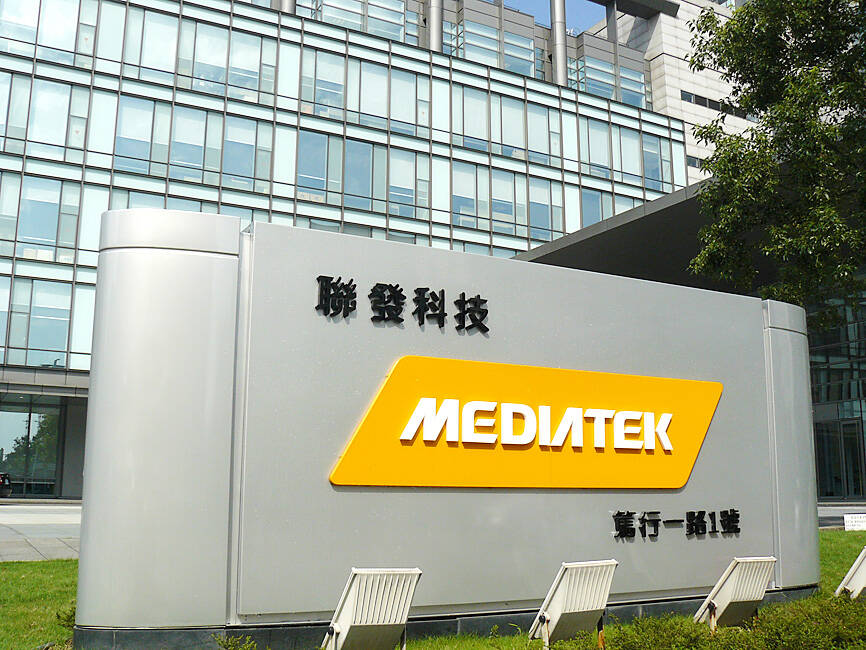MediaTek Inc (聯發科) paid the highest average annual compensation to non-managerial full-time employees of any of Taiwan’s listed companies, according to a report published by Taiwan Stock Exchange Corp (TWSE) yesterday.
MediaTek’s non-managerial employees earned NT$3.754 million (US$115,384) on average last year in total compensation, which includes regular salary and monthly stipends, overtime pay, and irregular income such as bonuses, allowances and profit distributions.
Though the figure was down 22.8 percent from the previous year, MediaTek still ranked first in the category for the third consecutive year, the TWSE said.

Photo: CNA
A total of six listed companies paid non-managerial employees average compensation of over NT$3 million last year, with IC design companies taking four of those places, exchange data showed.
In second place was Novatek Microelectronics Corp (聯詠), with average annual compensation of NT $3.712 million, followed by JSL Construction & Development Co (愛山林) with NT$3.659 million, and Bestec Power Electronics Co (聯德) with NT$3.581 million.
The other two above the NT$3 million threshold were Realtek Semiconductor Corp (瑞昱) with NT$3.149 million and Global Unichip Corp (創意) with NT$3.134 million.
Taiwan Semiconductor Manufacturing Co (台積電), the world’s largest contract chipmaker, saw its average compensation for non-managerial full-time employees fall 10.2 percent to NT$2.842 million last year, ranking seventh, according to the report.
In terms of median compensation, which may provide a more accurate look at overall compensation levels because it eliminates outliers, Bestec led the pack at NT$3.749 million, followed by MediaTek with NT$3.094 million and Novatek with NT$3.028 million.

Semiconductor business between Taiwan and the US is a “win-win” model for both sides given the high level of complementarity, the government said yesterday responding to tariff threats from US President Donald Trump. Home to the world’s largest contract chipmaker, Taiwan Semiconductor Manufacturing Co (TSMC, 台積電), Taiwan is a key link in the global technology supply chain for companies such as Apple Inc and Nvidia Corp. Trump said on Monday he plans to impose tariffs on imported chips, pharmaceuticals and steel in an effort to get the producers to make them in the US. “Taiwan and the US semiconductor and other technology industries

SMALL AND EFFICIENT: The Chinese AI app’s initial success has spurred worries in the US that its tech giants’ massive AI spending needs re-evaluation, a market strategist said Chinese artificial intelligence (AI) start-up DeepSeek’s (深度求索) eponymous AI assistant rocketed to the top of Apple Inc’s iPhone download charts, stirring doubts in Silicon Valley about the strength of the US’ technological dominance. The app’s underlying AI model is widely seen as competitive with OpenAI and Meta Platforms Inc’s latest. Its claim that it cost much less to train and develop triggered share moves across Asia’s supply chain. Chinese tech firms linked to DeepSeek, such as Iflytek Co (科大訊飛), surged yesterday, while chipmaking tool makers like Advantest Corp slumped on the potential threat to demand for Nvidia Corp’s AI accelerators. US stock

SUBSIDIES: The nominee for commerce secretary indicated the Trump administration wants to put its stamp on the plan, but not unravel it entirely US President Donald Trump’s pick to lead the agency in charge of a US$52 billion semiconductor subsidy program declined to give it unqualified support, raising questions about the disbursement of funds to companies like Intel Corp and Taiwan Semiconductor Manufacturing Co (台積電). “I can’t say that I can honor something I haven’t read,” Howard Lutnick, Trump’s nominee for commerce secretary, said of the binding CHIPS and Science Act awards in a confirmation hearing on Wednesday. “To the extent monies have been disbursed, I would commit to rigorously enforcing documents that have been signed by those companies to make sure we get

UNUSUAL TIMING: The success of DeepSeek has prompted a scramble among its domestic competitors to upgrade their own AI models Chinese technology company Alibaba Group Holding Ltd (阿里巴巴) yesterday released a new version of its Qwen 2.5 artificial intelligence (AI) model that it said surpassed the highly acclaimed DeepSeek-V3. The unusual timing of the Qwen 2.5-Max’s release, on the first day of the Lunar New Year when most Chinese people are off work and with their families, points to the pressure Chinese AI start-up DeepSeek’s (深度求索) meteoric rise in the past three weeks has placed on not just overseas rivals, but also its domestic competition. “Qwen 2.5-Max outperforms ... almost across the board GPT-4o, DeepSeek-V3 and Llama-3.1-405B,” Alibaba’s cloud unit said in